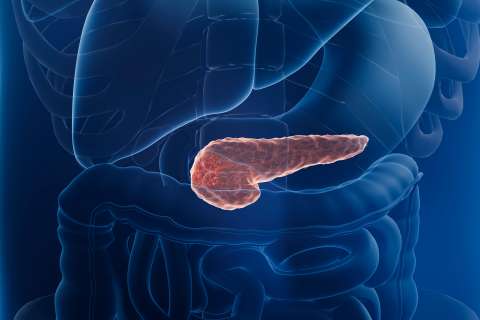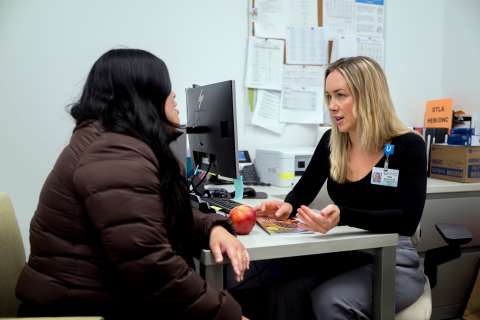When Sina Sinbari’s back started hurting in 2022, the 21-year-old figured he’d pulled a muscle.
A top collegiate volleyball player at New Jersey’s Fairleigh Dickinson University, Sinbari was always training, always pushing himself to improve. So he’d overdone it at the gym, he thought.
When the pain persisted, he went to physical therapy, but none of the exercises or stretches seemed to help. He went for an X-ray, then an MRI.
That’s when he got the life-changing news. It wasn’t a pulled muscle. It was cancer — an extremely rare, aggressive cancer.
Called desmoplastic small round cell tumors, the cancer is a soft tissue sarcoma that produces tumors in the abdomen and pelvic area. It affects fewer than 100 people a year, mostly men in their 20s and 30s.
Beginning treatment
The disease is so rare, physicians at Sinbari’s local medical center at first didn’t know what they were looking at on his scans. A chance meeting with an oncologist at a family function a month before the diagnosis led Sinbari to UCLA Health, which is internationally known for its multidisciplinary approach to treating sarcomas. He withdrew from school and moved back home to Orange County to start treatment.
Chemotherapy began almost immediately. To receive the toxic infusions to shrink the tumors before surgery, doctors installed a port in his chest, leaving the plastic tube protruding from under his skin. Even still, Sinbari continued his volleyball training, regularly hitting the gym.
“I was still lifting. It kind of kept me sane, having goals,” Sinbari says. “I was fixated on getting back to volleyball.”
In April of 2023, he underwent what his oncologist, Noah Federman, MD, a member of the UCLA Health Jonsson Comprehensive Cancer Center, describes as “major abdominal surgery,” led by fellow UCLA Health JCCC members Joseph Crompton, MD, PhD and Mark Girgis, MD. With that operation, Sinbari thought the worst was over.
“Initially, I didn’t realize how big something like this was,” he says. “There are videos of me going, ‘Yeah, it will be an eight-month-long process. I’ll probably just buzz my head and I’ll just do this round and that round.’”
But his journey was just beginning.
The mental battle
Though the surgery diminished the cancer, it didn’t remove it entirely. Sinbari’s follow-up treatment called for five days a week of both chemotherapy and radiation, overseen by radiation oncologist Vishruth Reddy, MD, PhD. Despite the strenuous schedule, Sinbari kept working out and going out with his friends. He’d watch videos of Kobe Bryant and ultramarathon runner David Goggins – athletes with “extreme mentalities” – to stay inspired.
“To survive, to get through this cancer, I had to be a little crazy,” Sinbari says. “If I wasn’t so crazy, I wouldn’t be training while doing chemo. A normal person would be like, ‘I’m not going to play (volleyball) again. I don’t care about that.’ But because I was a little crazy, I was like, ‘I’ll be back. I’ll be back. I’ll be back.’”
To process what he was going through, Sinbari would go for drives along the ocean. He’d think, pray, cry and talk to God. He reflected on his losses: He and his girlfriend broke up just before the diagnosis; then his beloved grandmother died; and now he was away from school, away from his team and fighting for his life.
The treatments took a toll, sapping his strength and straining his spirit. Eventually, he was too weak to continue training. More than a dozen rounds of chemotherapy and radiation left him so debilitated, he was hospitalized for almost a month.
“I couldn’t think too much about anything or I’d be too depressed,” he says.
A friendship
While in the hospital, Sinbari met a 9-year-old patient he called Z. Z was struggling with his cancer treatment protocol. He often refused to eat.
Sinbari decided to cheer Z up. They’d talk sports and listen to music — Sinbari made a pump-up playlist to help them through treatment. They’d watch videos online, and Sinbari asked his athlete friends to create personalized videos just for Z.
His empathy was incredible, Dr. Federman says: “If I was going through this, I wouldn’t be talking to anybody.”
After being released from the hospital, as Sinbari started regaining his strength his focus shifted to helping children. He got an internship with Make-A-Wish, which fulfills the wishes of children with critical illnesses. He volunteered with Once Upon a Room, a nonprofit organization that transforms children’s hospital rooms into colorful, personalized, uplifting spaces.
And he regularly made trips to UCLA Health to visit Z, who remained in inpatient care, as they both continued their treatment.
Dr. Federman says that even during Sinbari’s most challenging times, he never failed to ask his oncologist about his day and how he was doing.
“He’s just the most thoughtful, empathic human being,” the doctor says. “People like him remind us how good humans can be, what people are capable of and the amount of love that exists. I hope my kids are going to be like that.”
Wins and losses
Finally, after more than a year away from school and many months without volleyball training, Sinbari felt healthy enough to begin working out again.
He started training at a gym in Orange County and coaching high school players. It was frustrating, he said, to remember how far ahead of them he used to be. Now he was struggling to keep up.
Still, his health continued to improve, so Dr. Federman cleared Sinbari to head back to the East Coast and return to school for the spring 2024 semester. His coach and his team were eager to welcome him back.
Initially, he was reluctant to go. He wasn’t the athlete he wanted to be; he was still regaining his strength. Then he rallied.
“Me in the hospital would have cussed me out if I didn’t go,” he says. “And if I got diagnosed again, or worse, in the summer, I could have gone for a semester at least and enjoyed it, traveled with the team.”
As he was preparing to return to college life, he received unexpected news: Z had passed away.
“I have a picture of him on my dashboard to keep me motivated and grounded,” Sinbari says. “Whenever I feel like I want to give up or if I’m feeling really negative, I look at that and think I’ve got to keep going for him. I’ve got to be grateful for being here.”
A new wisdom
Sinbari returned to school in late January. He continues to undergo treatment but is able to actively practice with the volleyball team. He still wishes he was in peak playing shape, but now he can see a bigger picture.
He got a glimpse of this new wisdom recently while riding in the passenger seat of his sister’s car with the windows down.
“For the first time in a year and a half, I felt the breeze pulling my hair back,” he says. “I was like, wow, I took that for granted and I’m really grateful I’m able to do that – and that I can have hair… . Now, instead of looking at what I don’t have, I’m looking at what I do have.”







